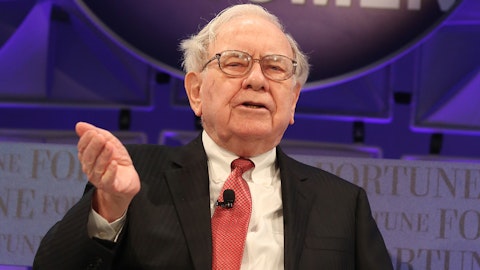Vicki Hollub : I would say with ADNOC, they know our track record of building major projects and they know Ken Dillon well, who’s actually manages our major projects. So they’ve seen us and how we not only we’re innovative in how we built Al Hosn, but we were also innovative in this just recent expansion to expand the plant by almost 50% with probably spend way under 10% is — was phenomenal. And so I think that ADNOC will be prepared to move forward with us sooner than waiting on what happens with Stratos. I think they all understand that technologies go through a cost down. There’s never been a technology that’s worked and been adopted in large way without having gone through the same kind of thing that we’ll go through with our director capture
Richard Jackson : Yes. And the only thing I would add, I mean, there definitely is different capital, I think as we’re able to move down that cost down over the next decade. We really like to partner with strategics like ADNOC or others that can be a part of not only the near term, but the long term. But obviously, we want to get the right value and set up the right economics for both parties as we bring them in. And so I think, of course, long term, as we bring costs down, the market forms, we expect that to open really capital, and that’s a big part of our ability to scale development. And so to answer your question, yes, I do think that changes — presents more opportunities over time.
Vicki Hollub : Yes. One final comment on it is, partnering with ADNOC, we know their capabilities and expertise, too. So we know what they bring to the table. And so that’s the other exciting aspect of this is having their knowledge and their experience, their expertise combined with ours, to do whichever we do or a combination of both the CCUS and the director capture.
Operator: The next question comes from David Deckelbaum with TD Cowen.
David Deckelbaum : I’m going to try to ask one perfect question. I was curious, you mentioned before, obviously, with the curve where it is now, you need to see it a bit higher to start prosecuting more preferred redemptions. Does the cash flow priority change given the fact that it’s harder to achieve that milestone in the coming quarters? Or should we expect sort of a similar pace or distribution or free cash via buybacks sort of irrespective of where the curve is in the back half of this year? And does it change how you think about capital allocation, perhaps into next year relative to sustaining capital versus growth capital?
Vicki Hollub : I would say that we’re not going to execute a large growth program in our upstream oil and gas business. So — but I will say that our intent is to keep a moderate capital spend, what we consider to be something similar to the activity level that we have on a whole year basis, not the second half, but take the second half of this year and project it into next year is what our oil and gas activity level would be. But what we want to do is we just want a program that delivers the best returns at present value. So that doesn’t mean that we’re going to take our capital framework right now and dramatically change it. Share repurchases is a part of that. And that’s — it’s an important part of that. And what we do will depend on the macro.
But from the — what — I would say what we see with the macro now, I wouldn’t discount our ability to do both to repurchase common shares whilst also being able to redeem some of the preferred next year because I do see a better price environment, I believe, than what some realize it’s going to be. So I think there are a lot of reasons pointing to a pretty good environment. So I wouldn’t discount it yet. I do believe that we’ll have the opportunity to do both, but share repurchases will always be a part of our framework.
Rob Peterson : The other thing I’ll add, David, too, is in 2023, because our share repurchase program is thus far, far more ratable in our concentration in purchases last year. We’re creating a foundation for 2024. We don’t have as many slugs to overcome with us that necessitate spikes in oil prices or whatever to get there. So we are laying the groundwork for next year even as we continue to buy share repurchases this year, whether or not we’re retiring preferred along with it or not.
Operator: In the interest of time, this concludes our question-and-answer session. I would like to turn the conference back over to Vicki Hollub for any closing remarks.
Vicki Hollub : I would just like to say thank you all for joining us, and have a great day.
Operator: The conference has now concluded. Thank you for attending today’s presentation, you may now disconnect.
Follow Occidental Petroleum Corp (NYSE:OXY)
Follow Occidental Petroleum Corp (NYSE:OXY)
Receive real-time insider trading and news alerts





